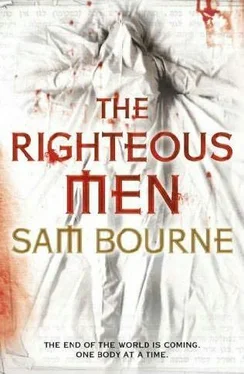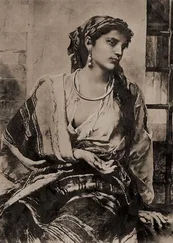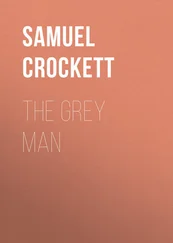Sam Bourne - The righteous men
Здесь есть возможность читать онлайн «Sam Bourne - The righteous men» — ознакомительный отрывок электронной книги совершенно бесплатно, а после прочтения отрывка купить полную версию. В некоторых случаях можно слушать аудио, скачать через торрент в формате fb2 и присутствует краткое содержание. Жанр: Триллер, на английском языке. Описание произведения, (предисловие) а так же отзывы посетителей доступны на портале библиотеки ЛибКат.
- Название:The righteous men
- Автор:
- Жанр:
- Год:неизвестен
- ISBN:нет данных
- Рейтинг книги:3 / 5. Голосов: 1
-
Избранное:Добавить в избранное
- Отзывы:
-
Ваша оценка:
- 60
- 1
- 2
- 3
- 4
- 5
The righteous men: краткое содержание, описание и аннотация
Предлагаем к чтению аннотацию, описание, краткое содержание или предисловие (зависит от того, что написал сам автор книги «The righteous men»). Если вы не нашли необходимую информацию о книге — напишите в комментариях, мы постараемся отыскать её.
The righteous men — читать онлайн ознакомительный отрывок
Ниже представлен текст книги, разбитый по страницам. Система сохранения места последней прочитанной страницы, позволяет с удобством читать онлайн бесплатно книгу «The righteous men», без необходимости каждый раз заново искать на чём Вы остановились. Поставьте закладку, и сможете в любой момент перейти на страницу, на которой закончили чтение.
Интервал:
Закладка:
'Now, these two souls are usually in conflict. A good person works hard to control his animal soul. To restrain his desires, not to give into every longing. That's what it is to be a regular, good person — to struggle!' He gave a creased smile, as if in recognition of the frailty of man. 'But a tzaddik is different.
A tzaddik does not just tame his animal soul. He transforms it.
He changes his animal soul into something else, turning it into a force for good. Now he is firing on two cylinders, so to speak! It's as if he has two divine souls. This gives him a special power. It equips him to save the world.'
'And would one act be enough?'
'How do you mean?'
'Well, if a man had performed one act of extraordinary goodness, would that be enough to say he was a tzaddik.'
'Perhaps you have some example in mind, yes? My answer is that it may seem to us as if the tzaddik performed just one holy act. But remember, these men hide their goodness. The truth may be that this is the only act we know about.'
'And what might such an act look like?'
'Ah, this is a good question. You know, in that story about Rabbi Abbahu and the man in the whorehouse-'
'The story from the third century?'
'Yes. In that story, the tzaddik has done something very small. I forget the details, but he makes some small sacrifice to preserve the dignity of a woman.'
Will heard himself gulp. Just like Macrae.
'And this seems to be the common thread. Sometimes it is an act on a very large scale-' Will thought of Chancellor Curtis in London, diverting precious millions to the poor '- perhaps a tzaddik will save an entire city from destruction.
Sometimes it is a tiny gesture to one individual: a meal when they are hungry, a blanket when they are cold. In each case, the tzaddik has treated a fellow human being justly and generously.'
'And in that way, even a small gesture might redeem a whole life?'
'Yes, Mr Monroe. The tzaddik may have lived as if he was drenched in sin. Think of Chaim the Watercarrier, drinking himself to oblivion. But those acts of righteousness, they change the world.'
'So goodness is not about rules. Or wearing a hair shirt.
Or praying hard. Or knowing every word in the Bible. It's about how we treat each other.'
'Being adam v'adam. Between man and man. That is where goodness, even divinity resides. Not in the heavens, but right here on earth. In our relations with each other. It also means we have to be careful. We have to treat everyone we meet with great respect because, for all we know, this man driving a cab or sweeping the streets or begging on a street corner, he might be one of the righteous.'
That's pretty egalitarian, isn't it?'
The rabbi smiled. 'The equal value of every human life.
This is the preoccupation of Torah. This is what Tova Chaya studied each day at the seminary. And what she studied here with me, before…' The rabbi looked wistful and, suddenly, very old. He did not finish his sentence.
Will felt guilty. Not personally — he knew he was not to blame for TO's leaving all those years ago. But he felt guilty as — he struggled to articulate it — as a representative of the modern world. That was it. It was modernity, America, that had lured young Tova Chaya away from the routines and rhythms that had shaped Jewish lives for centuries, whether in rural Russia or Crown Heights. It was Manhattan, shimmering glass buildings, K-ROC on the radio, tight-fitting jeans, Domino's Pizza, blockbusters at the Cineplex, The Gap, HBO, Glamour magazine, Andy Warhol at MOMA, rollerblading in Central Park, AmEx cards, one-click shopping, Columbia University, sex outside marriage — it was all that that had drawn TO away. How could the medieval conformity of Hassidic life compete? The drabness of the clothes, the regimented calendar, the countless limits — on what you could eat, what you could study or read or draw, on who you could love. No wonder TO had had to escape.
And yet, Will could see that TO had lost something by leaving. He could hear it in Rabbi Mandelbaum's voice and he had seen it in TO's eyes. He had experienced it for himself in those few hours before he was grabbed and grilled on Friday night. This place had something Will had hardly known, either growing up in England or living as an adult in America. The bland word for it was 'community'. People fantasized about that often enough. Back home, the myth of the English village, where everyone knows everyone else, still exerted a powerful hold, though Will had never seen it for real. In America, suburban picket-fence neighbourhoods liked to think they were communities — with their car pools and block parties — but they did not have what Will had seen in Crown Heights.
Here, people were as involved with each other as one large, extended family. An elaborate welfare system meant that each provided for the other as if they were drawing from a common pot. Children were in and out of each other's houses.
No one seemed to be strangers. TO had explained that the claustrophobia could be choking: she had had to get out to breathe. But she also described a warmth, a shared life, she had never known again.
Rabbi Mandelbaum had his head down, turning the pages of yet another book. 'There is one more thing. I don't know if this will be useful or not. According to several legends, one of these thirty-six men is even more special than the others.'
'Really? What kind of special?'
'One of these thirty-six is the Messiah.'
Will leaned forward. 'The Messiah?'
'"If the age were worthy of it, he would reveal himself as such." That's what the scholars say.'
'The candidate,' Will said softly.
'Someone explained this to you already?'
'TO told me that in every generation there is a candidate to be Messiah. If now were the Messianic time, then that man would be it. If it's not the time, then nothing happens.'
'We have to be worthy. Otherwise, the opportunity is lost.'
Almost involuntarily, Will looked at the photographs of the Rebbe, gazing out from every wall and every angle. Dead more than two years, his eyes still shone.
'Exactly,' said Rabbi Mandelbaum, following Will's eyes.
And the two men looked at each other.
The door opened. TO was standing there, clutching her phone. There was no colour in her face; her eyes were glassy, like an animal stunned for slaughter.
She bent down and whispered in Will's ear. 'The police are after me. I'm wanted for murder.'
CHAPTER FORTY-SIX
Monday, 2.20am, Darwin, Northern Australia
The music had stopped, that was why he had gone in. He kept this up throughout his shift, whether it was day or night — tip-toeing into the room to take out the finished CD and replace it with a new one. The bedside cupboard was full of them, Schubert mainly, left there by the old man's daughter.
The family had not asked Djalu to do it, but he knew it was what they wanted.
He put on the record. He could hear wailing from the next room along; he would have to be there in a second. But he wanted to stay a while with this resident, Mr Clark, the man who loved music. Djalu had only seen him awake for an hour or two each day; the sedative kept him asleep the rest of the time. But in those conscious minutes, Mr Clark seemed healed by the sounds of violins and cellos which uncoiled from the CD and into the room like stretches of fine thread. His aged lips parted as if to taste the melodies; his mouth sometimes made the same tiny movement even when he was in deep slumber.
Djalu would seize on those moments to take the small sponge, mounted on a stick, dip it into the bedside glass of water and brush it onto Mr Clark's mouth. The old man, nearly eighty-five, could no longer eat or drink, not without vomiting. So this was the only way to give him sustenance.
Читать дальшеИнтервал:
Закладка:
Похожие книги на «The righteous men»
Представляем Вашему вниманию похожие книги на «The righteous men» списком для выбора. Мы отобрали схожую по названию и смыслу литературу в надежде предоставить читателям больше вариантов отыскать новые, интересные, ещё непрочитанные произведения.
Обсуждение, отзывы о книге «The righteous men» и просто собственные мнения читателей. Оставьте ваши комментарии, напишите, что Вы думаете о произведении, его смысле или главных героях. Укажите что конкретно понравилось, а что нет, и почему Вы так считаете.












